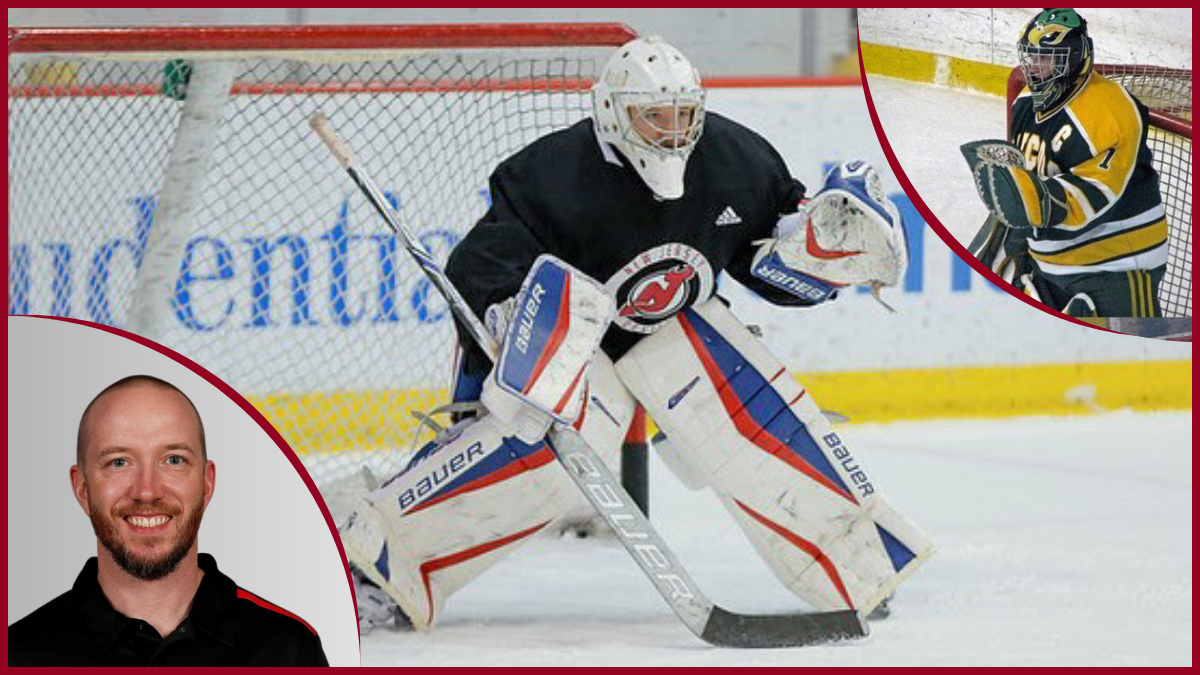Devan McConnell’s hockey journey began in the Kootenay International Junior Hockey League with the Spokane Braves, where he played goal for two seasons (2000-2002). The Seattle, Washington native played 55 games then moved onto the Bozeman Ice Dogs and St. Louis Junior Blues. He played four seasons of National Collegiate Athletic Association D3 hockey with Fitchburg State College.
In 2020, McConnell was named the Arizona Coyotes’ High Performance Director, joining the organization from the New Jersey Devils where he served as their Director of Performance Science and Reconditioning. The KIJHL spoke with McConnell about his time in the KIJHL and his work with the Coyotes.
This Q&A article has been edited for clarity and length.
KIJHL: What were your two seasons playing for Spokane like?
DM: It was a blast, I really enjoyed it. I grew up in Seattle and played Midget AAA and left before my last year to play for the Braves. From a hockey perspective, it was such a great experience and a big jump from playing Midget AAA. The junior lifestyle was a big jump and at the same time really enjoyable getting to live away from home for the first time and playing in a high-end league. You bus all over the B.C. Interior and living that lifestyle was fun. From a development standpoint, it was huge. It was a big step up talent wise and a great challenge – it helped me progress and grow as a player.
KIJHL: Was it knowing the quality of the league that led you to deciding on going to the KIJHL for your future?
DM: Yeah, absolutely. I wanted to play college hockey and knew that to get from where I was to where I wanted to go, I needed to play at higher and higher levels and have greater exposure and experience.
KIJHL: What did you end up studying at Fitchburg State College?
DM: I studied Exercise and Sports Science. Originally my career goal post hockey was going into physical therapy. They happen to have a program there that led into what would end up being graduate school for Personal Training. During my time there I realized I was more interested in working with healthy athletes than injured individuals so I pivoted towards the strength and conditioning route.
KIJHL: What is the reward that you get from doing the job?
DM: It’s just seeing our players be able to compete at the highest level and be the best version of themselves and being a piece of that puzzle, the group that competes every night and ultimately trying to get W’s. I like being with the group and seeing everybody compete and being at their best.
KIJHL: As the director of high performance with the Coyotes, you’re essentially in charge of helping the players perform at their best physically. What do you enjoy about doing that? How does that push you?
DM: My role now really is to oversee our performance, medical and development groups. I help tie all of those different clinicians and practitioners together to develop programs to keep our players as healthy as possible to help them perform at the highest level.
I really enjoy helping our athletes optimize and maximize what it is they’re able to do so they can go out and perform every night and compete and ultimately work towards winning the Stanley Cup. It’s very rewarding to get to work with these guys every day and solve the puzzles around how to keep them as healthy as possible so they can compete and optimize what they do really well.
KIJHL: What would you say to any KIJHL players that read this when it comes to considering a career in this field.
DM: It’s super rewarding. I’m a guy that likes to be in the gym and I like hockey and I get to work in an NHL facility. That’s a pretty fun thing to do and it helps you stay in the game. You get the competitive juices. One thing that guys always talk about when they finish playing is missing being in the locker room and around the team and I’ve been fortunate to find a career path that keeps me in that space so it’s a lot of fun.
KIJHL: What is it like to work with NHL players?
DM: It’s a lot of fun and exciting. It’s almost like trying to solve a different puzzle every day. Everybody has unique individual needs. These players are the absolute best in what they do. It’s finding small areas to help them improve and ultimately, the most important thing at this level is keeping guys on the ice and healthy. It’s like being the pit crew of a Formula One car and trying to make small improvements, small adjustments over time to keep all four tires on the track.
KIJHL: You mentioned before when we were setting up this interview that when you were with the New Jersey Devils, you ended up going in net and facing shots in practice. What was it like facing Devil shooters when they needed you in goal?
DM: Yeah, it was fun and terrifying at the same time. Guys can shoot a lot harder and are stronger than when I played. They are certainly at a much higher level than I got to. There’s a couple of opportunities whenever we had a goalie that one of the guys was out sick or needed a break and just needed an extra body and I happened to be around. It was fun going out and getting lit up by some of those guys.


























